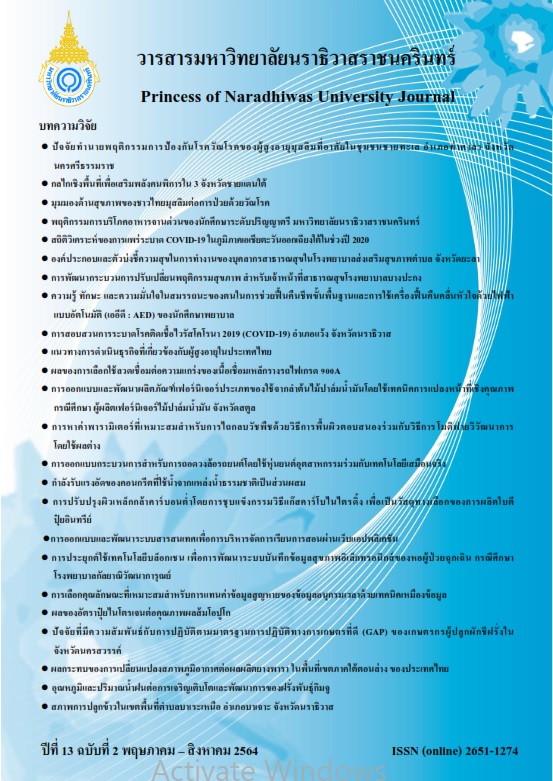Using Blockchain Technology for Developing an Electronic Health Record of Emergency Ward: A Case Study of Galyanivadhanakarun Hospital
Keywords:
Blockchain, Data Integrity, Electronic Medical Record, Hospital Emergency Ward, Peer to Peer NetworkAbstract
Using Blockchain technology for developing an Electronic Health Recordis intended to apply Blockchain technology to medical management in the emergency ward. This process is important because it is the first gate to pass patients through other medical care departments. This stage needs Data Integrity recordings and requires a high level of security. Existing internal desktop application systems could face the problem of the centralized database with weak security on a network. Therefore, this article aims to analyze the information transmission using blockchain through the peer-to-peer environment with monitoring on hash result. By verifying the data integrity based on the peer-to-peer network's hash function encryption method. This allows securely shared data between nodes and protected transactions over the network, which is also accurate in data transmission. We conducted a survey by using a sample of medical staffs which including 39 people of the nurse, pharmacists, patients, and physicians. The survey results showed that 50% of the survey participants were aware of the importance of patient health data, 52.94% strongly agreed about confidentiality and privacy on health information, and 44.12% strongly agreed that health data should be displayed correctly. 100% of the samples after testing the system confirmed that the represented data was completely accurate (X=5.00/5.00) and more than 40% of the sample group had a very good level (X=4.10-4.21/5.00) of satisfaction in all four areas.
References
Asad, S. A., Aisha, J. Z., & Zawish , M. (2019). Applications of Blockchain Technology in Medicine and Healthcare: Challenges and Future Perspectives.
Asaph, A., & Ariel, E. (2016). MedRec: Using Blockchain for Medical Data Access and Permission Management. International Conference on Open and Big Data (OBD), (pp. 25-30). Cambridge, MA, 02139, USA.
Benet, J. (2014). IPFS - Content Addressed, Versioned, P2P File System. CoRR abs.
Ekblaw, A., Azaria, A., & Halamka, J. (2016). A Case Study for Blockchain in Healthcare:“MedRec” prototype for electronic health records and medical research data. 2016 2nd International Conference on Open and Big Data (OBD).
hosxp. (2020). hosxp. Retrieved October 10,2020 from hosxp.net
Leeming, G., Cunningham, J., & Ainsworth, J. (2016). A Ledger of Me: Personalizing Healthcare Using Blockchain Technology. Frontiers in Medicine, (p. 6).
Muneeb, A., & Nelson, J. (2016). Block-stack: A global naming and storage system secured by blockchains. USENIX ATC 2016, 181-194.
Neiheiser, R., Gustavo, I., & Luciana, R. (2019). HRM Smart Contracts on the Blockchain. 2019 IEEE Symposium on Computers and Communications (ISCC).
Nikita, K., & Kirill, P. (2020). Transaction Protection in Corporate Networks Based on Distributed Ledger Technology. IEEE Conference of Russian Young Researchers in Electrical and Electronic Engineering (EIConRus).
Yanti, T., Lianna, S., & Alifah, N. (2018). User Satisfaction Factors on Learning Management Systems Usage. International Conference on Information Management and Technology (ICIMTech).
Zikratov, I., Alexander , K., & Vladislav, A. (2017). Ensuring data integrity using blockchain technology. 2017 20th Conference of Open Innovations Association (FRUCT).




